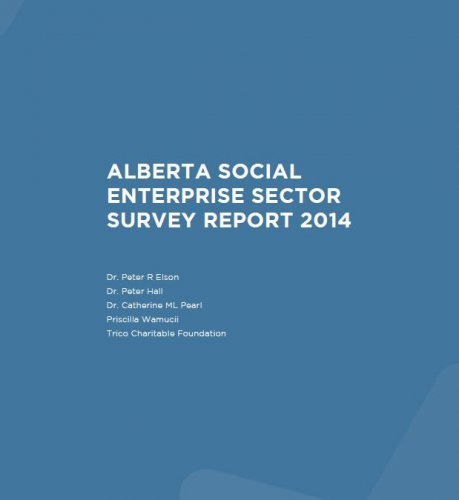A scan of the local social enterprise economy
Social enterprise is evolving across Alberta: communities are supported, clients engaged, and ideation and creative innovation are being nurtured. Increasingly, Albertans are becoming aware and supportive of social enterprises operating within their local communities.
The third Alberta social enterprise sector survey was conducted in May and June, 2014, following previous surveys undertaken in 2010 and 2012. Respondents were asked to report on organizational activities during the previous operating period (e.g. the year to December 31, 2013). In addition to the presentation and analysis of the survey statistics, this report also reflects a series of findings from key thought leaders across the province invited in early 2015 to participate in the qualitative portion of this study. The key informant interviews were undertaken to explore in depth, the social enterprise milieu, emerging trends as well as perceived opportunities and challenges. Additionally, the report highlights areas within the data that provoked new questions concerning the Alberta social enterprise landscape and future research possibilities.
This study’s intent is to provide a contemporary portrait of the landscape of social enterprise in Alberta. It does not purport to represent a definitive compilation or summary of current literature or research on social enterprise across Alberta or Canada. Rather, through careful and considered examination, this report may be considered a barometer of what is occurring in Alberta at this point in time.
The quantitative data originating from the survey is presented in chapters, using a lens that incorporates three overarching characteristics – first, the community-based nature of social enterprises in Alberta; second, their particular focus on social and cultural missions; and third, the need for continued sector capacity building.
It is increasingly recognized that social enterprises can make a significant contribution to the provincial economy through community engagement, contribution to local economies, and through the building of social capital. Moreover, social enterprises can make money as they address their organizational purpose; whether economic, cultural, environmental or social. Social enterprise increasingly builds capacity – not simply capacity within an organization or its surrounding community, but also for some of Alberta’s most vulnerable citizens. For some observers, this may be perceived as an unintended consequence, however for other stakeholders, the fact that social enterprise may be used as a tool to train, to empower as well as build social capital, may indeed be one of its greatest assets and its potential promise going forward.
Based upon these overarching characteristics, the following key points were identified:
- Social enterprises in Alberta revealed that they are most likely to operate at the scale of a neighbourhood or local community (60%), at a city or town scale (69%), and/or a regional district scale (51%).
- Social enterprises engage people in multiple ways, unlike the more restrictive employee and client relationship found in traditional business structures. Survey results suggest an individual may have multiple, intersecting connections within a social enterprise. These connections may be as a customer, but extend to engagement as a member, a recipient of training or services; as an employee and/or as a volunteer.
- Survey participants were asked to indicate their organization’s purpose. Results revealed that social enterprises exist for a number of different purposes with the most commonly cited responses as follows:
- 79% of social enterprises operate to achieve a social mission.
- 64% of social enterprises operate to achieve a cultural mission.
- Social enterprises provide paid employment to at least 3,590 workers in the province, which includes fulltime, part-time, seasonal and contract workers. In 2013, employees in the responding social enterprises earned at least $ 28 million in wages and salaries. As well it is noteworthy that fulltime, part-time and seasonal workers are estimated to represent 2,330 fulltime equivalent employees.
- Total revenue in 2013 for the 101 survey respondents was at least $57 million. This includes the sale of goods and services of $32 million, accounting for 56% of total revenue reported.
In addition to this information, the qualitative data gathered pointed to four key themes emerging within the ecosystem of Alberta’s social enterprise sector: the broadening base for social enterprising activity, the distinct nature of urban social enterprises compared to rural social enterprises, social finance opportunities, and required capacity building supports to ensure the future success of social enterprise in Alberta.
This research indicates that social enterprise in Alberta has a long history, is well established and represents a rapidly growing sector across urban and rural centres. Moreover, this study’s mixed methods approach highlights potential areas of further inquiry for academics, practitioners and intermediaries.
This report may be considered a resource to build understanding and extend learning regarding what is occurring across communities locally, nationally and internationally. Social enterprise is increasingly described as a social movement in Alberta, other Canadian provinces, and internationally; it points to a sea change that is occurring worldwide. Recognizing the timing of this report’s release, a broader community dialogue is encouraged in terms of the economic, social, cultural and environmental benefits that social enterprise can introduce to Alberta’s economy.
Download the Alberta Social Enterprise Sector Survey Report 2014
Table of Contents
Executive Summary
Chapter One: An Evolving Landscape: Social Enterprise in Alberta
Introduction
Recent Activities and Growth in Alberta
Chapter Two: Respondents to the Social Enterprise Sector Survey Alberta
Sectors of Operation
Population Served
Age of the Social Enterprises
Financial Results
Sources of Financing
Chapter Three: Of Community, For Community
The Rural and Urban Expanse
Chapter Four: Social Enterprise in Alberta is Purpose-Focused
Creating an Economy: Employment and Employability
Citizen Engagement: Membership and Volunteerism
Poverty: A Multi-Purpose Approach
Chapter Five: Challenges and Supports
Governance
Financial
Operational
Marketing
Conclusion
Future Research
References
Appendices
Appendix A: Key Points of Comparison- Purpose
Appendix B: Questions Provoked Summary
Appendix C: Data Notes and Methodology
Appendix D: Distribution Tables
Appendix E: Provincial Comparisons
Appendix F: Business Sector Classification
Appendix G: Questionnaire





